Our college years are full of exciting moments but also hardships. Dealing with all of the difficulties alone can feel distressing. A mentor can help you choose classes, manage time, prepare for tests, and help you tackle other challenges.
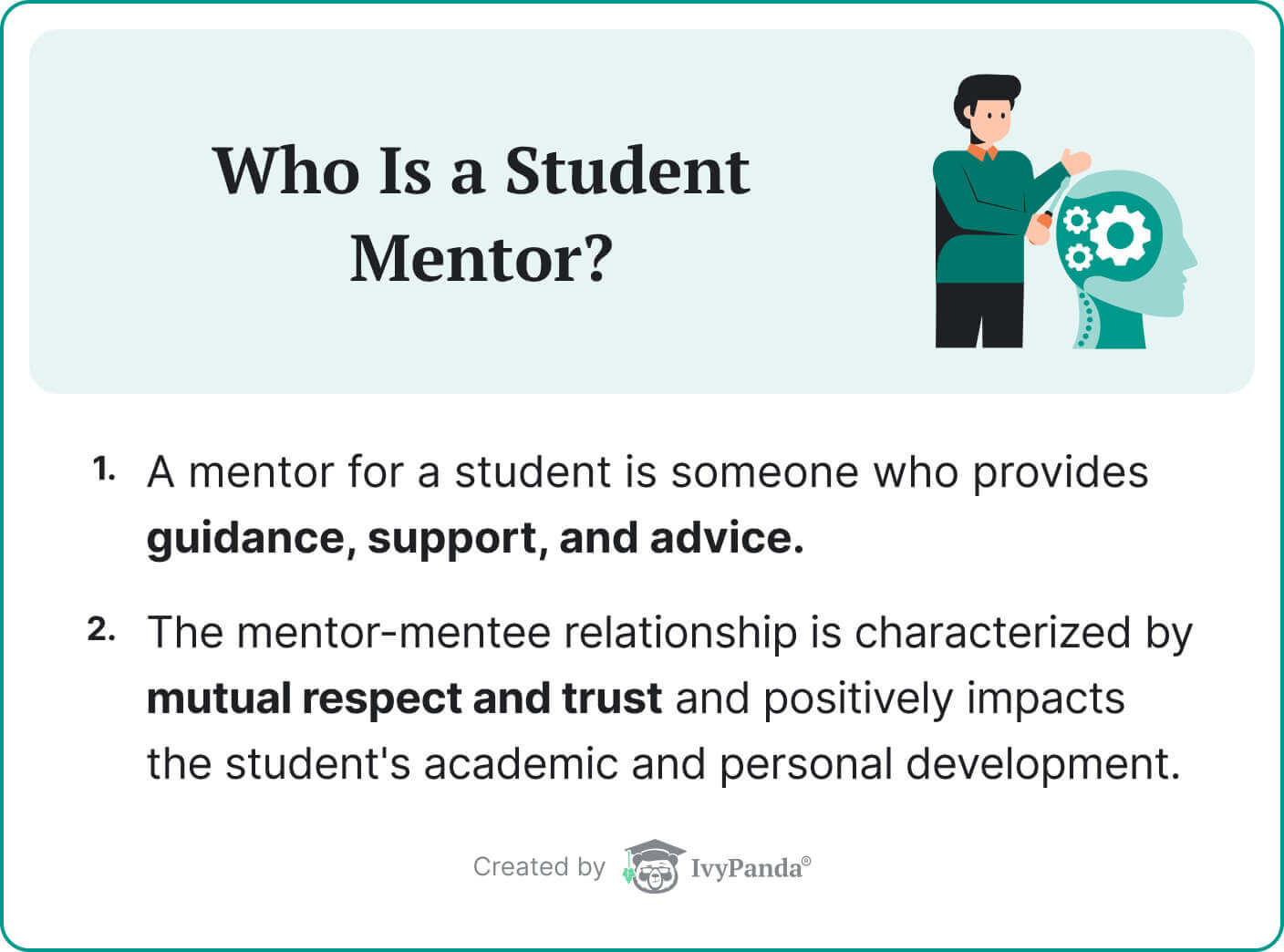
Mentors are people experienced in academic and professional development who support, advise, and guide students. They are like tutors who help you succeed in the different spheres of your life. In this article, our expert team discusses diverse college mentorship programs and the benefits you can reap from them.
🔦 Student Mentoring 101
The concept of mentoring originated with the character of Mentor in Homer’s Odyssey. In this Ancient Greek epic poem, Odysseus leaves his young son to his trusted companion, Mentor, and goes to fight in the Trojan War.
Nowadays, mentorship exists as a supportive relationship between a mentee and a mentor. The former wishes to learn from someone else’s experience, while the latter shares knowledge. Mentorship is a common and rewarding practice in the spheres of education, career, and self-growth. These are its universal principles:
- A mentor creates a safe environment where a mentee can reflect without being judged.
- A mentor gives accurate feedback but doesn’t make decisions for the mentee.
- The relationship between a mentor and a mentee rests on trust and shared values.
Mentoring can be especially crucial in college. The 2018 Gallup Alumni Survey revealed that college graduates were almost twice as likely to find a job if they had a mentor who motivated them to follow their goals. Student mentors offer academic, professional, and personal assistance and can be a precious source of support.
What Does a Student Mentor Do?
Student mentors can assist you with academic goals and personal and professional issues. Here are some examples of what they can do for you.
🎓 In education, a mentor can:
- Notice the early warning indicators that you may be off track.
- Help organize your schedule to fit your needs and prevent overload.
- Assist with maintaining a work-life balance and having time for extracurricular activities.
- Monitor the exam and test preparation to guarantee better grades.
🛠️ In career, a mentor does the following:
- Helps identify the most critical classes for a future career.
- Provides information on career events on campus, such as job fairs and public talks.
- Offers feedback on a CV and can write a recommendation letter.
🎭 In daily life, a mentor can:
- Help explore new ideas and increase self-confidence without judgment.
- Create a safe space to tackle mental health issues like anxiety or depression.
- Guide how to improve communication with other people.
6 Undeniable Benefits of Having a Mentor
For many students having a mentor is a life-changing experience. Here are some of the advantages of having a mentor you should consider:
- It helps set and track individualized goals. Together with a mentor, you can work on setting individual short and long-term objectives and developing an action plan. Such an intentional weekly interaction helps achieve a lot in college, career, and life.
- It improves self-awareness and decision-making. An essential component of working with a mentor is self-reflection. If you regularly practice reflection with your mentor, you can assess your strengths and recognize areas for self-improvement.
- It allows for constructive and supportive feedback. When working with a mentor, you get helpful and timely feedback that can boost your progress. Having a mentor also creates an opportunity to address any issue quickly and resolve it on the spot.
- It offers psychological support. A mentoring relationship is a safe space for you to grow spiritually without fear of judgment and receive reassurance from someone you trust. The opportunity to share your feelings with someone else eases stress and anxiety.
- It creates the foundation for a lasting personal network. In many cases, the relationship between a mentor and a mentee remains even after college graduation. In other words, mentoring creates a special bond that you might find helpful throughout your life.
- It offers a diversity of perspectives and experiences. College offers plenty of extracurricular activities. You can consult with your mentor to learn more about them and find activities that best fit your needs.
🤔 Who Needs a Mentor
Everybody who wants to achieve great things in life needs a trusted mentor. However, there are specific categories of students who can take the most advantage of mentorship:
- First-year students and the ones who transferred from another college. A mentor will help them adapt and become independent sooner.
- Young people with mental health issues. Weekly mentoring sessions can help reduce stress and anxiety.
- Students who represent ethnic minorities. They need a mentor they can trust to avoid feelings of isolation.
- Students who experience burnout. A mentor can help those under academic stress to evaluate their priorities and maintain a study-life balance.
- Individuals with low self-esteem. Mentorship allows them to embrace their vulnerabilities and show up for themselves.
- High-achieving and motivated learners. They also need a mentor’s support to stay on track. In fact, mentorships are most productive when students are committed to their goals.
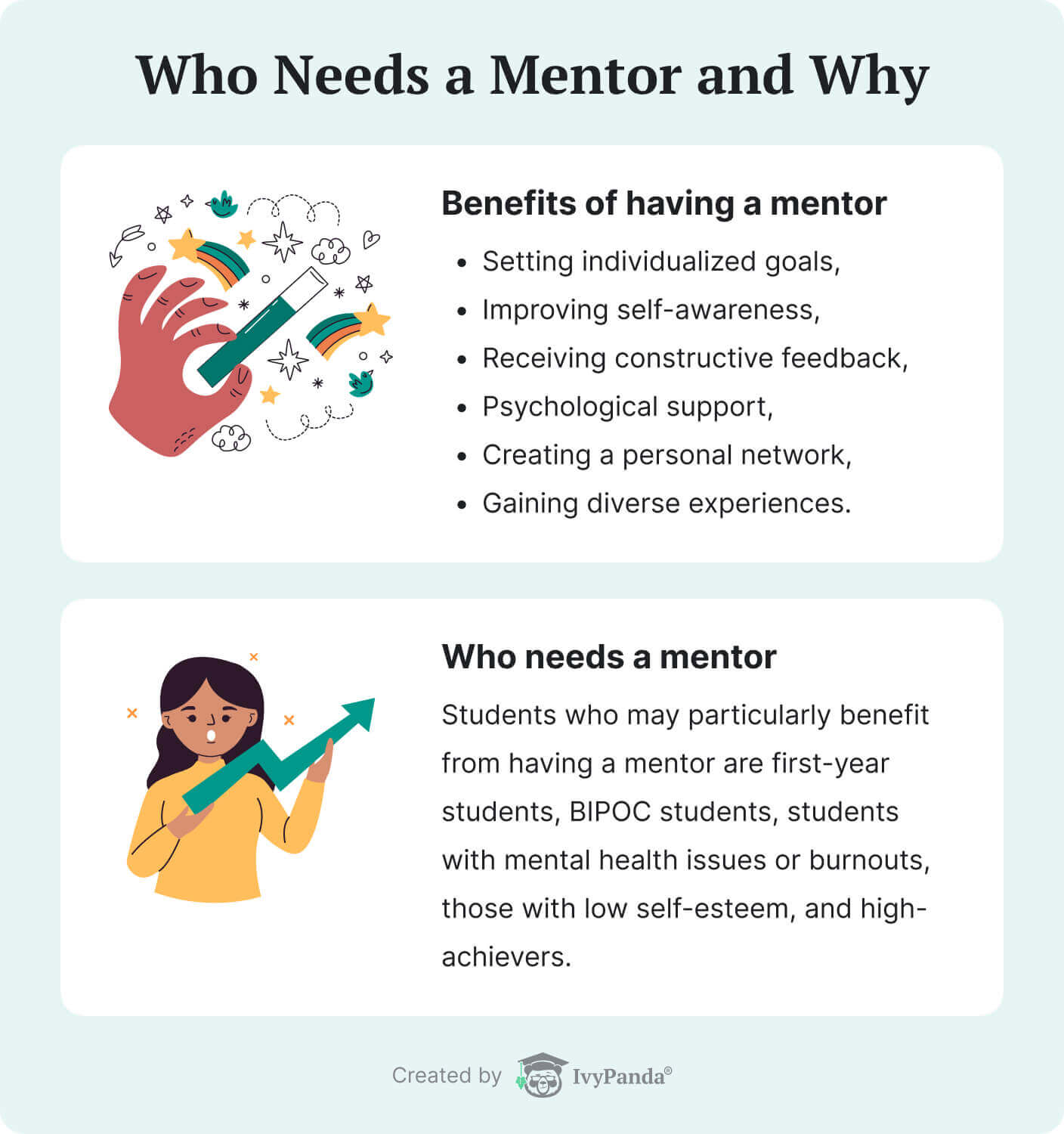
Checklist: Do You Need A Mentor?
Are you still wondering if you need a mentor? Review the checklist below to find widespread circumstances in which you might benefit from mentorship.
- You don’t know what classes to choose.
- You’re unsure which extracurricular activities will look best on your CV.
- You don’t know what to do after college.
- You need guidance on the financial aid process or another college procedure.
- You want to meet new people and become more communicative.
- You need some advice on how to boost your soft skills.
- You want someone with whom to share your feelings and worries.
Overall, having a mentor benefits any student and can prove helpful in many unexpected ways. In the next section, you’ll find a guide on how to find a mentor.
📜 Types of Mentoring
Mentoring exists in many forms to suit the needs of diverse students. Let’s consider the most popular types: one-on-one, group, situational, peer, and reverse mentoring.
Traditional One-on-One Mentoring
A one-on-one mentorship commonly lasts for a defined period — often several months to an academic year. The mentor and mentee meet regularly, like several times a month. However, if the relationship is mutually beneficial, it can continue for far longer. One-on-one mentoring can occur in person (such as grabbing a coffee) or online. The format depends on a student’s preferences.
Traditional one-on-one mentoring can create a safe space for an open dialogue about your academic and career objectives. This format also enables a mentor to aid when needed.
Group Mentoring
Group mentoring occurs when three or more individuals exchange knowledge and experience. If everyone in the group is in the same college year, this is similar to peer mentoring. However, there can be a person who has more academic or professional experience and can direct group sessions.
This type is an excellent solution for students eager to grow their network. Sharing your experience with like-minded people helps boost personal growth, build skills, and develop healthy peer relationships.
Situational Mentoring
Situational mentoring is useful for developing a particular skill or solving a specific problem. This type involves a mentor with experience in a relevant context. The aim is to create an action plan and track progress.
If you wish to try situational mentoring, identify the issue you desire to handle. It can be improving your time management, choosing classes for the following semester, or joining a club on campus. Usually, situational mentoring is short-term, requiring only a small number of meetings.
Peer Mentoring
Peer mentoring happens when students, usually in the same year or major, gather to tackle specific issues and share their insights. This approach allows them to learn from peers’ experiences and develop multiple solutions to a problem.
Peer mentoring can be super helpful because it creates a trusting atmosphere where each participant matters. It promotes transparent and fear-free communication for students to share their problems without criticism. However, there is a risk of a group getting stuck without an experienced mentor.
Reverse Mentoring
Reverse mentoring happens when a student coaches someone more knowledgeable, like a senior student or an administration officer. This might sound counterintuitive. However, this method fosters intergenerational understanding and friendship. For instance, a student may introduce a range of apps and websites they use for learning or creative purposes. When participants maintain an attitude of openness and dissolve barriers of status and position, they can significantly benefit.
👩💼 How to Get a College Mentor
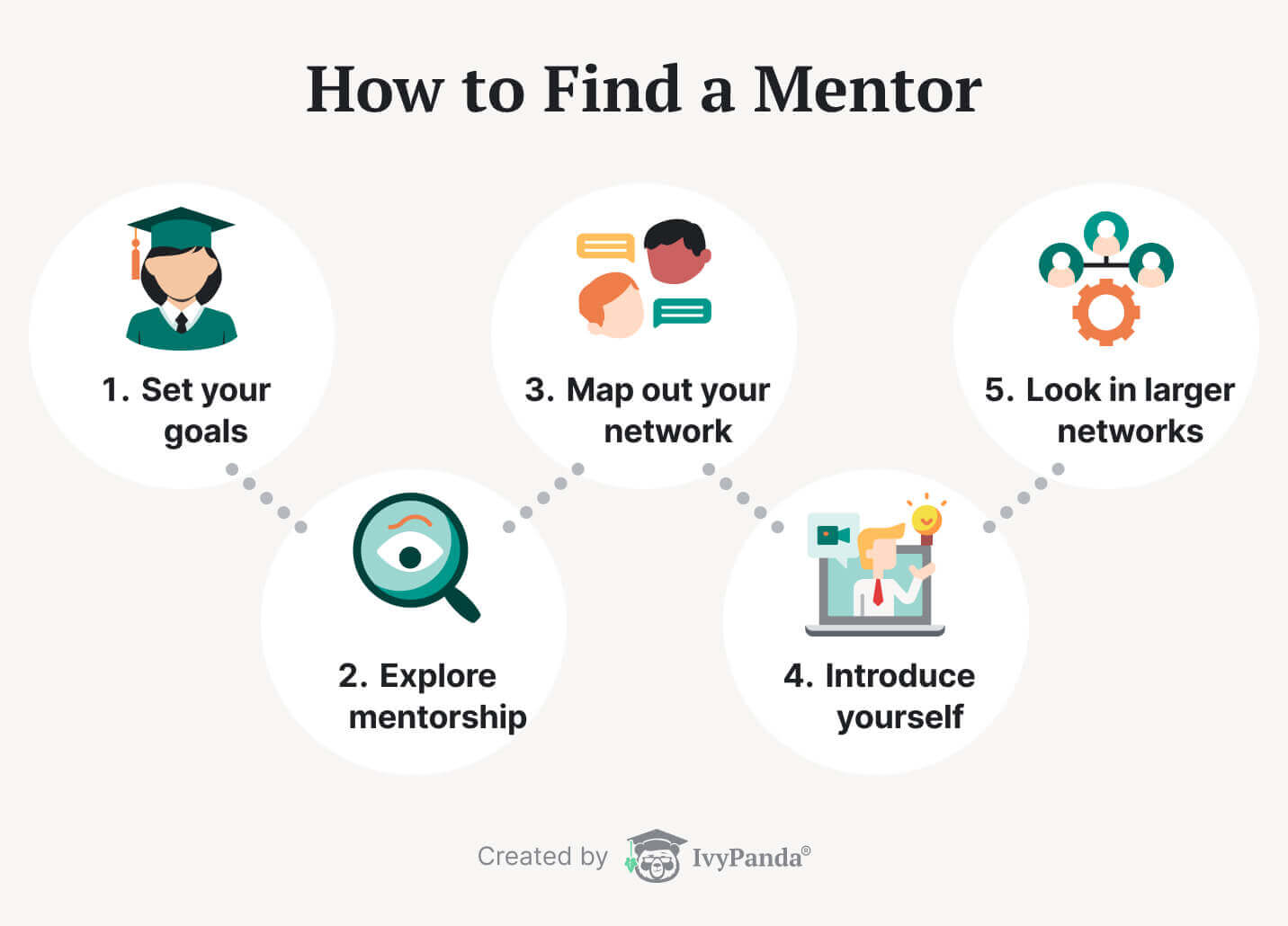
We prepared a guide to help you find a mentor:
I. Identify Your Goals
Before starting to work with a mentor, clearly understand your goals. Determine if you wish to improve your studies, career, or personal life. You can also picture your ideal self and convey your vision to a mentor. Together, you can then create a strategy and track your progress. If you cannot describe your goals, don’t worry. Consider sharing your doubts with a mentor; you can discover solutions together.
II. Research Different Mentorship Styles
The next step is to pick the mentorship style among those we described above. When choosing, think about which one will best suit your needs. It might be a hard choice if you haven’t had a mentor before. However, remember that you can always change your mind and pivot to a different style.
If you’re a communicative person, group or peer mentorship might be the best fit for you. Consider a traditional one-on-one format if you prefer individual sessions.
III. Map out Your Network
When looking for a mentor, think about inspiring people in your social circle. These could be individuals with a similar mindset or who share your interests. If you don’t have an ideal mentor candidate, try asking someone from your network for recommendations.
Network mapping lets you identify if you’re at the right place. If you feel like something is missing and you need to socialize more, try joining some campus activities. There is a high chance you might meet your future mentor in one of these college clubs.
IV. Present Yourself
Many colleges are eager to help students find their perfect mentors. Nevertheless, you also need to put effort into finding a mentor that will be a good match. Consider your strengths and how you contribute to the mentorship practice. The more sincere you are, the higher the chance you’ll find a mentor with whom you can create a strong bond. Moreover, identifying your strengths and weaknesses will make mentorship more effective.
V. Look in Larger Networks
You can find a mentor in the more extensive networks outside your social circle. Don’t hesitate to talk with your professors, join campus clubs, participate in honors societies, or start an internship.
In addition, many colleges have mentorship programs, some examples of which we will explore in the next section.
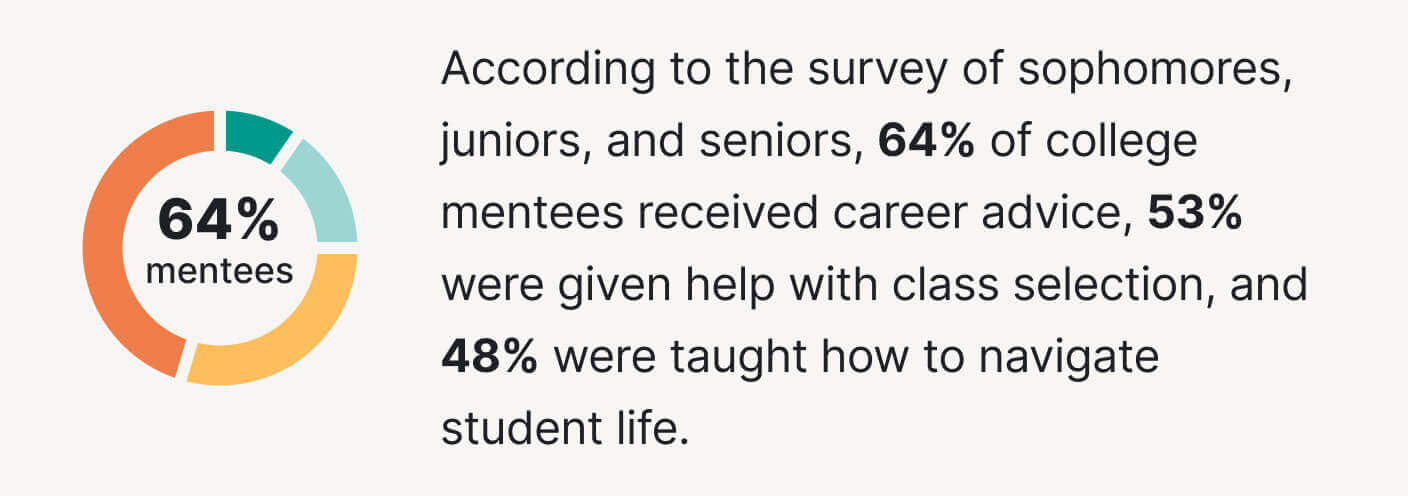
🧑🏫 College Mentorship Programs
Various college mentorship programs exist to assist specific groups of students. For instance, there are special mentorship programs for young women in tech, international students, youth of color, and many more.
Mentorship Programs for Women
Female mentorship programs enable young women to level up in their studies and careers, support gender equality, and close the gender gap in leadership roles. Some popular projects include:
- Sister to Sister Mentoring Program. This program at Santa Monica College exposes middle school students to positive female role models.
- Society of Women Engineers. Founded by the University of Minnesota, SWE empowers female students to realize their potential in engineering.
- Million Women Mentors. This international initiative motivates women to pursue and thrive in STEM careers.
Mentorship Programs for BIPOC Students
BIPOC student (Black, Indigenous, People of Color) mentorship programs support the academic and professional endeavors of young people who often face discrimination. Some examples include:
- The Mentoring of Students and Igniting Community. MOSAIC at Columbia University gives first-generation and BIPOC students support and resources for professional growth.
- Brother to Brother Mentoring. This program takes place at Santa Monica College and pairs less experienced male students with more knowledgeable mentors to boost their personal growth.
- Sweatt Center. Provided by the University of Texas, this program exposes Black male students to opportunities and guidance to enhance their studies and careers.
Mentorship Programs for LGBTQ+ Students
Programs for LGBTQ+ students increase learners’ access to inclusive spaces where they can be themselves without fear of judgment or persecution. Here are the top LBGTQ+ mentorship programs:
- LGBTQIA+ Mentoring Program. The American Psychological Association offers a free mentoring program for LGBTQ+ graduates in psychology. Participants are couched by colleagues with similar experiences and goals.
- oSTEM. This one has over 100 student chapters across the United States and abroad. It targets LGBTQ+ people in STEM-related disciplines and helps them thrive professionally and enlarge their support network.
- LGBTQ+ Mentoring Program at Roanoke College. It helps LGBTQ+ mentees integrate into college life and make strong connections with themselves and others.
Mentorship Programs for First-Years
The first year at college can overwhelm young people adjusting to a new routine. However, with mentorship, youth can get assistance with scheduling, classes, and extracurricular activities. Here are some of the best options:
- First-Year Mentor Program at Iowa State University. It focuses on students’ educational achievement and allows them to get first-hand scientific research experience under a mentor’s guidance.
- Peer Navigator Program. Created by Santa Monica University, this program offers mentoring, frequent communication, workshops, and social events to support first-year students’ transition.
- First-Year Mentor Program at Michigan State University. It aims to foster a sense of belonging for first-year students, encourage successful academic and personal development, and create an extensive network.
Other Examples
For your inspiration, we collected other examples of college mentorship programs:
- College of Science and Engineering (CSE) Mentorship Program. In this program, students can receive valuable career information, build their professional networks, refine communication skills, and explore new areas of interest.
- Peer Mentorship at Santa Monica College. It allows students to exchange advice and personal experiences. The program creates a safe environment where students can grow and develop long-lasting bonds.
- The ScholarShot Model. This international program matches students with a trusted mentor who provides support, advocacy, and resources to ensure successful graduation. A mentor also assists with degree plans and budgets and provides emotional support.
- Professional Mentoring Program at the College of Health and Human Sciences. It allows students to learn from successful experts. Working with such mentors enables participants to gain valuable professional insights and start career development.
☝️ Recap: Why Have a Mentor?
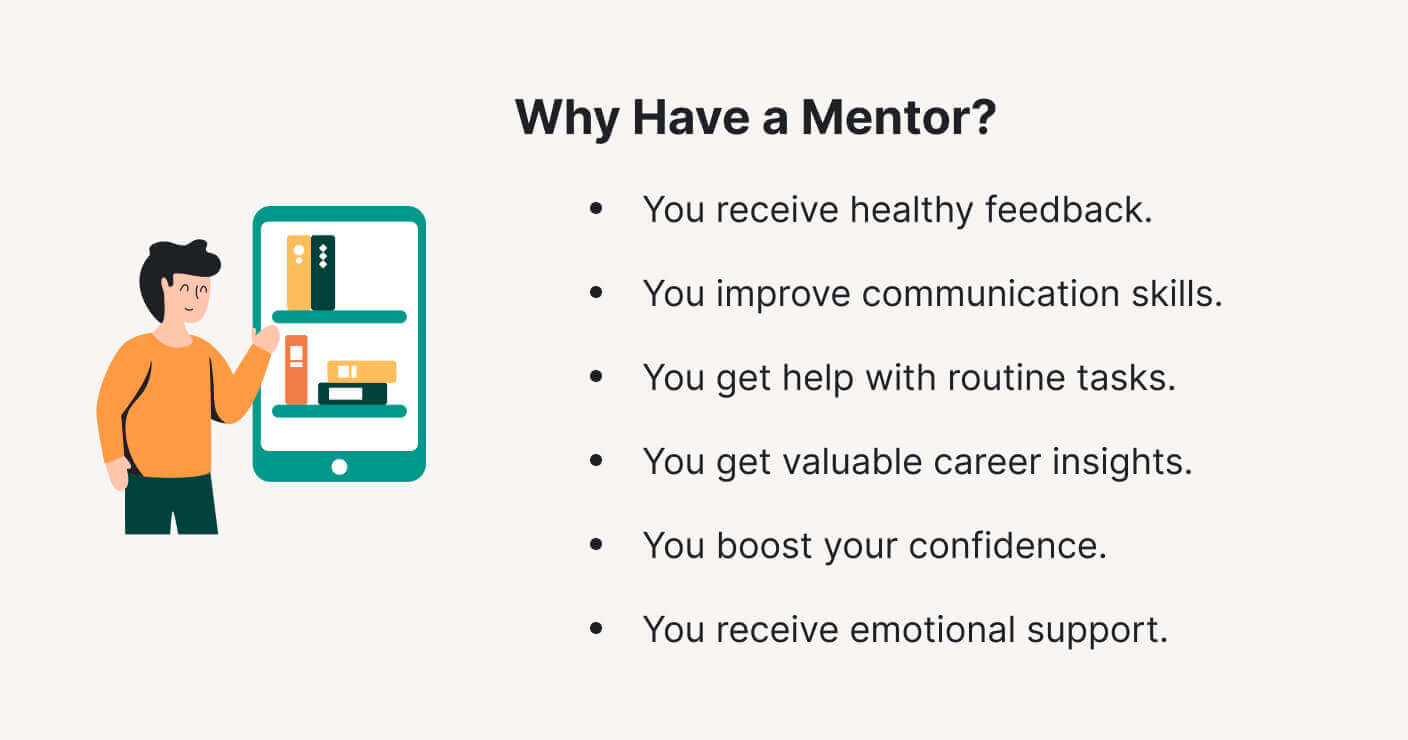
You should consider getting a mentor if you want to get the best out of your college years. Nowadays, there are plenty of mentorship programs. If you still aren’t sure about finding a mentor, reflect on these benefits you can get:
- Help in critical academic and professional situations.
- Feedback and encouragement to help you grow.
- Opportunity to enhance communication skills and build a network.
- Development of self-awareness and leadership skills.
- Help with routine tasks, such as schedule planning.
- Updates on college events.
- Ability to share hardships with a trusted person and find solutions together.
- Valuable insights on career success factors.
- A chance to enhance your confidence and set higher goals.
- Emotional support and lower risks of burnout.
Building a relationship with a mentor is a life-changing journey. Don’t waste the opportunity. Get a trusted mentor who will help you become the best version of yourself.
🔗 References
- Mentoring Impact. Connect with a Young Person | Mentor
- The Mentoring Relationship | Human Resources
- Why Every Student Should Have a Mentor (Opinion)
- College mentor relationships reach savvy students most | Inside Higher Ed
- What Are the Types of Mentoring?
- How To Find a Mentor in 8 Steps (Plus Mentorship Tips) | Indeed.com
- How to ask someone to mentor you | It’s Your Yale
- The lifelong benefits of mentoring | APA
- Why You Should Have a College Mentor (and How to Find One) – Azusa Pacific University
- All the Benefits of Having a Mentor | Western Governors University



